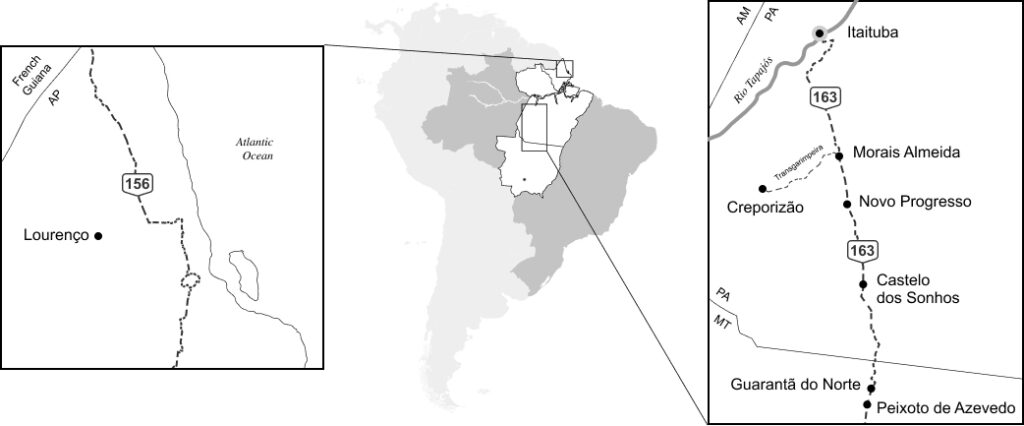For gold mining communities in the Brazilian Amazon, responses to Covid-19 is two sided: on the one hand, the vulnerability of small-scale gold miners (garimpeiros) is exposed, while on the other their capacity to find coping solutions is revealed.
- Edit
Luciana Massaro, Marjo de Theije, Jorge Calvimontes
Mining is an essential activity
“Unfortunately, bills will come soon and if garimpeiros don’t work, they don’t receive anything, and this is the reason why people go back to work” (Garimpeiro from Peixoto de Azevedo, state of Mato Grosso, Brazil).
#covid19mining is the hashtag used on Twitter to identify news about coronavirus in relation to mining. The tweets reveal three trends: how indigenous communities are struggling; calls for emergency actions for vulnerable communities; and malicious strategies by governments and mining lobbies to increase profits from the pandemic. Clearly, with coronavirus rapidly spreading in countries where there is a large presence of artisanal and small-scale mining, pre-existing conflicts underpinned by the economic inequalities linked to mining have become more explicit.
Brazil is no exception to the global situation. Since late March, when the Ministry of Mines and Energy declared that mining was an “essential” activity, permitting miners to continue to work despite the pandemic outbreak, an intense debate around miners’ health risks has arisen. There was widespread concern that the Ministry of Mines and Energy refused to accept the risk of infection associated with mining activities, and was therefore exposing workers to the imminent danger. In the case of gold mining. Declaring mining “essential” has no foundation in the technical aspects of production and instead is a political decision from President Jair Bolsonaro’s government.
The media and politicians direct their attention towards large-scale mining operations, leaving a big gap in understanding how artisanal and small-scale gold mining (ASGM) communities are being affected by and are responding to the emergency. Therefore, in April and May 2020, we collected data on how the COVID-19 crisis was affecting garimpeiros in two Amazonian regions: one along the BR-163 highway (from Peixoto de Azevedo, in the state of Mato Grosso, to Itaituba, in the state of Pará) and the other, Lourenço, in the state of Amapá.

We collected reports on the impact of COVID-19 through oral and written WhatsApp conversations, which allowed us to access information from people locally involved in ASGM. Nevertheless, with COVID-19 rapidly spreading through the Brazilian Amazon, the situation may have changed.
The published results of our investigation “Small-scale gold mining and the COVID-19 pandemic: Conflict and cooperation in the Brazilian Amazon” reveal how the impact of Covid-19 has two sides. On the one hand, the pandemic compounds challenges to an already precarious working system. This leads garimpeiros to positions of further vulnerability. On the other hand, the pandemic highlights the capacity of garimpeiros to self-organize and navigate the difficulties to find alternative solutions to cope with the crisis.
Impact of Covid-19 on mining communities
“Our little clinic is not sufficient for the local health demands; we don’t have an ambulance or any instrument to prevent the spread of the virus” (Garimpeiro from Lourenço, state of Amapá).
Underlying the contradictory responses to the pandemic, the political situation in Brazil underpins decisions by garimpeiros to work as normal. President Jair Bolsonaro uses rhetoric to diminish the impact of the disease and to encourage Brazilians to return to work to keep the economy running. As a result, the current severity of the pandemic and the confused policy response weighs heavily upon already vulnerable communities. The health emergency has weakened an already precarious healthcare system and it is difficult to access basic health services, especially in remote mining areas. Due to state failures in health and social service support, mining communities rely heavily on local networks of cooperatives and associations.
Another effect of COVID-19 in faraway regions like Lourenço, is the impact on the price of gold paid to garimpeiros. ASGM miners typically receive between 3% to 5% less than the global market price but since the pandemic and the restrictions on mobility started, garimpeiros can only sell their gold in the local shops and have been forced to accept very low rates. This picture has been repeated around the world: a ruinous combination of increased gold prices, supply chain limitations and lack of cash has widened the difference between local and global gold prices. In early April, retailers were paying 180-210 R$ / gram to the garimpeiros, when the international price of gold was 280 R$ / gram, which is a difference of 35-25%.
An opportunity for cooperation
ASGM is characterized by inequalities and controversies. Garimpeiros are a heterogeneous social group, who have been historically vulnerable and who often work informally and illegally (de Theije, 2020). At present, COVID-19 is threatening the ASGM sector on many fronts, further revealing pre-existing conflicts. Amongst other factors, conflicts in ASGM stem from social and economic fragility, high levels of informal and illegal practices, precarious health and working conditions, and negative socio-environmental impacts (World Bank, 2019).
Although mining activity has not stopped with COVID-19, the repercussions over the sale of gold and on the local economy were already apparent in April and May 2020. The health emergency has weakened an already precarious healthcare system and the failure of the federal state in giving support to the mining communities makes them even more vulnerable and more exposed to power inequalities. Cooperatives and associations that emerged to achieve the longed-for formalization and legalization of the ASGM sector are widening their role by helping garimpeiros and their families to access subsidies and health care. Exemplary in this regard, is the emergency distribution of food supplies to garimpeiros and their families, and an information campaign “Campanha de combate ao COVID-19” to promote the adoption of health measures carried out by one cooperative of garimpeiros in the area of Peixoto de Azevedo. As we discussed in our recent publication, these strategies of self-organization have the potential to provide experiences and build knowledge and networks that may lay the ground for conflict transformation processes post-crisis. This knowledge is important for understanding how local people can organize the sector in terms of new practices for employee healthcare, and, of course, for environmental and social sustainability. This may all contribute to building stronger mining communities after the crisis.
We would like to thank Raíssa Resende de Moraes and Carlos Henrique Araujo, both PhD students in the Gold Matters Project, who helped with data collection.
Dr. Luciana Massaro is a post-doctoral fellow at the Núcleo de Estudos e Pesquisas Ambientais/NEPAM, Universidade Estadual de Campinas/UNICAMP (FAPESP Grant nº 2020/07985-6) and at the Dept. of Social and Cultural Anthropology of the Vrije Universiteit, Amsterdam.
Prof. dr. Marjo de Theije is professor Anthropology of Resources at the Department of Social and Cultural Anthropology, Vrije Universiteit, Amsterdam.
Dr. Jorge Calvimontes is a post-doctoral fellow at the Núcleo de Estudos e Pesquisas Ambientais/NEPAM, Universidade Estadual de Campinas/UNICAMP (FAPESP Grant nº 2019/09709-9).
Gold Matters: Sustainability Transformations in Artisanal and Small-scale Gold Mining: A Multi-Actor and Trans-Regional Perspective is a transdisciplinary research project which aims to consider whether and how a transformative approach towards sustainability can arise in Artisanal and Small-scale Gold Mining (ASGM). For more information see www.gold-matters.org.
